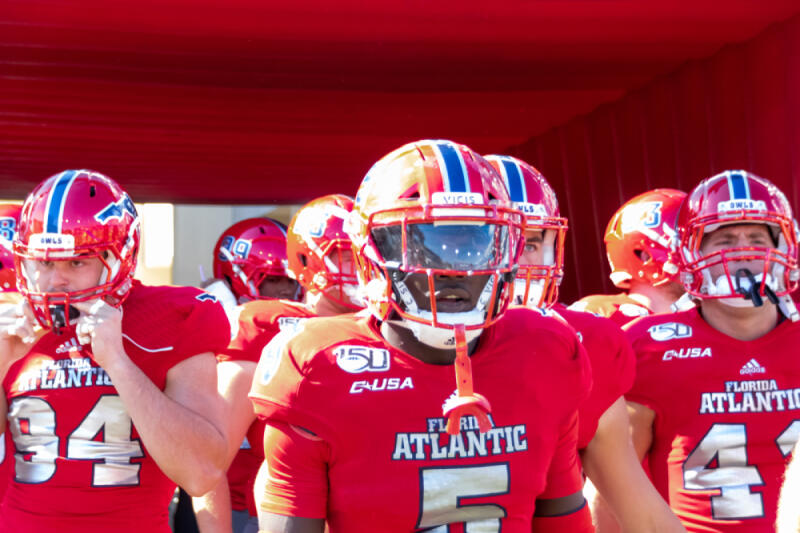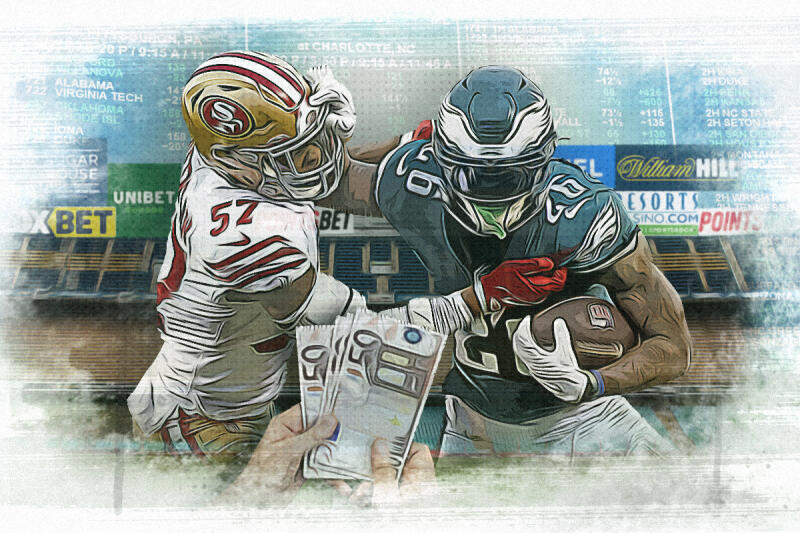What Is An Underdog Betting In Sports - 101 Guide
It’s almost always more fun to root for the underdog, particularly when it comes to sports. Just look at the best sports movies in history. There’s a reason why Rocky Balboa was the protagonist, not Apollo Creed or Ivan Drago. “Rudy” is the ultimate underdog story and one of the most beloved sports stories of all time.
It’s more satisfying when the underdog wins because it’s not what was supposed to happen. When it comes to sports gambling, there’s even more incentive to bet on the underdog. In addition to the satisfaction of seeing a team or an athlete overcome the odds, betting on the underdog brings a greater potential return on a gambler’s investment.
What is an Underdog?
In a sports betting context, an underdog is any participant that is not viewed to be the most likely winner of an event. A team can be an underdog for a game, a series or over the course of an entire season.
The biggest underdogs aren't simply considered unlikely to win—a potential victory is sometimes viewed as nearly impossible. When these underdogs are able to shock the world and come out on top, it’s the pinnacle of what sports are all about.
Leicester City’s 2016 Premier League Championship was arguably the greatest underdog story in the history of professional sports. Leicester City started the season with 5000/1 odds (+500000) to win the title for the first time in its 132-year history. Those odds suggest that Leicester City had a .02% chance to win the championship.
The 1980 United States hockey team has to be mentioned in the conversation. There’s a reason why the USA’s victory over the seemingly unbeatable USSR is called the “Miracle on Ice.” The win was so monumental that many people don’t even realize that the Americans had to play Finland after beating the Soviets in order to clinch the gold medal.
Underdogs Bet Types
Moneyline underdogs
Moneyline underdog bets are among the most difficult underdog bets to win. Thus, they typically offer a good return.
The underdog has to win the event outright in order for your underdog bet to be successful. Unlike other underdog bets, if the team (or player) is more competitive than expected but doesn’t come out on top, the bet is a loss.
The underdog almost always has “plus” odds, while the favorite—the participant given the best chance to win—has “minus” odds. For example, if one team has +150 odds and their opponent has -130 odds, the team with +150 odds is the underdog.
A bet on a team with +150 odds simply means that you can win a $150 profit by risking $100. The same math applies to other amounts. A winning $50 bet at +150, for example, would result in a $75 profit.
Point Spread Bets on the Underdog
If you’re making a point spread bet on the underdog, your wager can still cash if the underdog fails to win outright. All the underdog has to do is cover the point spread and lose by a certain margin.
Take the last game of the 2023 NBA Finals. The Denver Nuggets were favored against the underdog Miami Heat. The point spread was 8.5 points in favor of the Nuggets. Denver beat Miami 94-89 to win the game and the championship. Because the Heat lost by less than 8.5, a point spread bet on Miami was a winning wager.
Over/Under betting
Technically, you can make an underdog bet when it comes to over/unders, even though you’re betting on total points and not a team or player. One side is sometimes more likely to occur and thus has minus odds. The less likely outcome has plus odds and offers a greater return for your bet.
Let’s say the over/under for a basketball game is 210 points. The over could have -130 odds and the under might have +110 odds. If you bet the under, the combined score must stay below 210 points in order for your bet to be a winner.
Prop betting
The same principles that apply to the other underdog bets apply to prop bets. Prop bets allow sports bettors to make wagers on certain outcomes within a game.
One common prop bet is the total number of points a player will score in a game. You are essentially betting on the over/under for an individual and not a team. If Nikola Jokic has +130 odds to score more than 24.5 points, a prop bet on his over will be successful if he scores 25 points or more.
Basics of Underdog Odds and Implied Probability
Because an underdog is considered more likely to lose, an underdog’s implied odds are always less than 50%. The higher the odds, the lower the implied probability. Betting on big underdogs means you don’t have a great chance to win your wager. When such a bet does hit, however, it offers a great return.
There are some great odds calculators available for anyone to use on the internet. Punch in the odds and the calculator will tell you the implied chance of the bet becoming a winner. It’s simple math, and the implied odds can help you decide if your wager is worth the risk.
A bet with +100 or “even” odds has an implied probability of 50%. An underdog with +150 odds has a 40% implied probability. A +200 bet comes with a 33.33% implied probability. Want to take a shot on a +1000 underdog? Those odds suggest that your wager has just a 9.09% chance of being successful.
The odds for an underdog will always be better than the odds for the favorite in the same event. A -200 favorite has a 66.67% implied probability. The underdog in that same game might have +150 odds (40% implied probability). The favorite is more likely to be the winning side, so the underdog comes with better odds. The more likely a favorite is to win, the less a sportsbook will reward you for betting on that favorite.
Analyzing Underdog Opportunities
Not every underdog bet is a good bet. Far from it. Sports bettors can be enticed by high odds with the chance to risk only a little bit of money to make a large profit. But those odds are high for a reason, and the losses on underdog bets could add up quickly. How should you know what underdogs are worth betting on?
Evaluating Team Performance Metrics
The key to underdog betting is finding teams that are undervalued. An underdog might have +300 odds (25% implied probability) because the majority of bets are being placed on their opponent. If that underdog more likely has around a 40% chance of winning (+150), they are a worthwhile bet.
A closer analysis of how well a team has performed recently or in certain situations could provide insight when it comes to underdogs. Maybe the underdog is flying under the radar during a recent winning streak. Are they road underdogs even though they usually perform better away from home? If a team with a losing record has outscored its opponents over the course of the season, it could be a sign that they are about to turn things around and start winning a higher percentage of their games.
Exploring Matchup Dynamics
The old adage says that “styles make fights.” It’s not only true for boxing or MMA. Certain matchups can favor underdogs, even if it’s not reflected in the odds. Injuries and head-to-head records might give an underdog more value than the odds suggest.
Take an underdog that is facing a division rival. Does that team have a competitive record against the favored opponent in recent years? Because the underdog is familiar with their rival and knows their tendencies, they could have a strong chance to pull off an upset, despite the gap in talent.
Bankroll Management
There is still plenty of risk involved in betting on underdogs, even though some wagers only require a small bet for a much greater reward. Bankroll management is important if you want to be able to continue betting responsibly.
Flat betting, or betting the same amount of money on every wager, is a worthwhile strategy for many sports bettors. It will prevent you from losing your entire bankroll on only a handful of bets. It might be the best way to go for novice bettors.
Proportional betting limits wagers to a small percentage of a gambler’s bankroll. If you have a $1,000 bankroll and your bet size is 1%, then you would make a $10 bet for each wager with proportional betting.
Conclusion
When done responsibly, underdog betting should be a low-risk, high-reward prospect. Underdog bets are unlikely to win, but you can hit fewer than 50% of such wagers and still turn a profit. By doing some research and looking closely at important statistics and matchups, you can gain an edge in underdog betting. Find underdog bets that have value and you should make money in the long run.
Underdogs Betting FAQs
What is the underdog in betting?
The underdog is the side that doesn’t have the best odds to win.
Are underdog odds always positive?
Underdog odds are almost always positive. There are rare occasions when both the favorite and the underdog have minus odds. In that scenario, the underdog is the side with the lower number next to the minus sign.
Does betting on the underdog make sense?
Betting on the underdog makes sense if the bet’s chance of winning matches or exceeds the implied probability of the underdog’s odds. Betting on underdogs can be profitable if you find value when making wagers. Matchups, injuries and underlying stats can help determine a good underdog bet.
What are the best markets for underdog bets?
Futures markets offer the best value for underdogs.
Our editorial content strives to be highly informative and educational to our audience, especially for visitors who are new or relatively new to analyzing and predicting sporting event results. All of our content is created by informed writers with backgrounds in their subject area and reviewed for omissions or mistakes.
Our editorial team is run by individuals with many years of experience in digital publishing, editorial, and content production. Our editorial content is always marked clearly in any instances where it may be sponsored by a third party, though it is still reviewed by our staff to ensure it remains consistent with our company mission.
- Popular
- Latest





